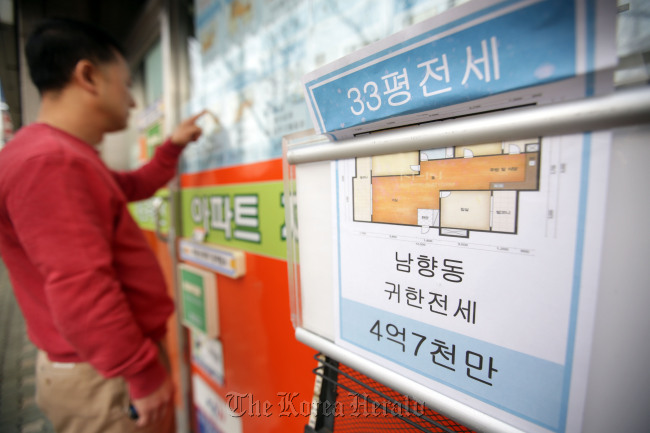More Koreans are expected to struggle to pay higher jeonse prices this year with many tenants postponing plans to buy homes in fears of slowing growth in property value as well as of a potential increase in interest rates.
According to market analysts and reports, the greater demand for jeonse ― a scheme popular in Korea where tenants give a large deposit to the landlord upfront in lieu of paying monthly rent ― could push deposit levels to record highs and force more tenants to pay in monthly fees instead, as they may also find difficulties borrowing large sums of money from banks due to the government’s tightening measures on mortgage borrowing.
Household debt, as well as the weight of financial burdens on dwelling expenses will be felt heavier than before with their income growth lagging. Businesses are also expected to implement restructuring measures and cut down costs, they warned.
 |
A citizen examines apartment rent price tags posted outside a real estate agency in Seoul on Sunday. (Yonhap) |
The widespread economic uncertainties and subdued consumer sentiments offer a dimmer outlook for the nation’s property market, experts pointed out.
Rumors are rampant that housing prices could further go down and hit their bottom in 2018, with a large amount of houses expected to be listed in the market by the cash-strapped aging population.
Starting in February, the nation’s financial regulator is also set to implement a fresh guideline on mortgage borrowing, requiring banks to issue loans only after assessing a borrower’s debt repayment ability, based on their annual income, rather than the value of collateral alone. The plan was released by the Financial Services Commission last month in a bid to curb mounting household debt for the potential interest rate increase along with U.S. rate hike.
South Korea’s household credit topped 1.16 quadrillion won ($987 billion) in the third quarter, led by the government’s measures to stimulate the property market as well as interest rates that continue to remain low.
Last month, the Bank of Korea held its key rate steady at a record low level of 1.5 percent, saying that monetary tightening in the U.S. is not likely to have an immediate impact on Korea. The central bank said it would maintain its decision for a while without elaborating on a specific date. But it has been expected that the BOK would raise the benchmark interests eventually in the near future to prevent the possible outflow of capital overseas.
Meanwhile, the number of real estate transactions in Seoul surged 40 percent last year from the previous year, on benefits of the government-led housing policies and the low interest rate trend, according to data compiled by realtors in the city.
The number of rental agreements, of both jeonse and monthly payments, declined 2.3 percent in the same period. But the portion of rental agreements based on monthly fees accounted for 32.9 percent, an 8.7 percentage point increase from a year before ― reflecting the fast erosion of the jeonse system, the report said.
Seoul’s central districts of Jongno and Jung-gu topped the list of properties on monthly rental tenancies with 44 percent each, it added.
“With interest rates remaining at a low level, more landlords are offering properties on monthly fees to seek stable returns,” Park Won-gap, a senior analyst at Kookmin Bank was quoted as saying by Yonhap News.
“Along with deepening the jeonse crisis, the volume of monthly rent contracts is also expected to surge.”
By Cho Chung-un (
christory@heraldcorp.com)




![[Herald Interview] 'Trump will use tariffs as first line of defense for American manufacturing'](http://res.heraldm.com/phpwas/restmb_idxmake.php?idx=644&simg=/content/image/2024/11/26/20241126050017_0.jpg)

![[Health and care] Getting cancer young: Why cancer isn’t just an older person’s battle](http://res.heraldm.com/phpwas/restmb_idxmake.php?idx=644&simg=/content/image/2024/11/26/20241126050043_0.jpg)

